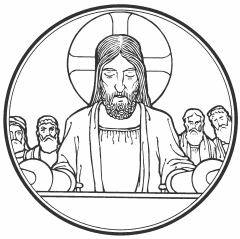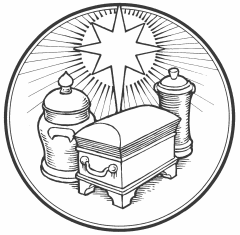Grace, mercy, and peace to you from God our Father, and from our Lord and Savior, Jesus Christ, amen. The text for the sermon this morning is the Epistle, which was read earlier.
I’m afraid to ask the question, but here goes: What is your idea of the perfect pastor? Is it one who is a great speaker? Is it one who is a people-person? Is it one who gets his hands dirty with regards to the inner workings of the church? Is it one who has qualities I didn’t mention?
In looking at the history of the Church, we see throughout that the Church’s pastors were not what we would call the perfect pastor. Peter, one of Jesus’ disciples and close friends, had denied Jesus not once, but three times. Following the resurrection, Peter was asked by Jesus three times whether or not he really loved Jesus. After denying Jesus three times, now Jesus invited him to declare his love for Him three times.
Paul was a staunch persecutor of the faith prior to his conversion. The number of Christians that Paul had put to death was astronomical in size. His sole purpose in life was to stomp out Christianity at any and all costs. The teaching was heretical and went against the core of Paul’s beliefs. And then suddenly, on the road to Damascus, Paul encountered Jesus Christ in the flesh and everything was changed. In the blink of an eye, Paul went from persecutor of the faith to defender of the faith.
God’s decision to save the world through the lowly message of the cross had been illustrated by His calling so many lowly people to form the Corinthian church. Paul introduces himself here as one who is not “showy” in his own preaching and personal bearing in the early days of his ministry among the Corinthians.
Regardless of the man, regardless of the pastor, there is only one thing that he should preach and that is what Paul tells the Corinthians: “For I decided to know nothing among you except Jesus Christ and him crucified.” There could be any number of things that a pastor could preach. He could preach about how good we are at our core. He could preach about how wealthy you will be if you only pray to God hard enough. He could preach that all roads lead to heaven, regardless of what you believe. But those pastors are leaving something out of their preaching: “Jesus Christ and him crucified.”
Wouldn’t we all love to hear that we’d be rich? Wouldn’t we all love to hear how good we are, no matter the evil we commit? Wouldn’t we all love to hear that everyone is going to heaven and no one is going to hell? While all that is nice, it is unfortunately false. That is not found within Holy Scripture. That is not found in the teachings of Jesus Christ.
What is found in the Holy Scriptures? They tell us “all have sinned and fall short of the glory of God.” They tell us, “Behold, I was brought forth in iniquity, and in sin did my mother conceive me.” They tell us “the wages of sin is death.” Those are not Scripture teachings that we want to hear, but those are the teachings that we need to hear, regardless of how much it hurts, regardless of whether or not we believe it.
What was the teaching and preaching that Paul was doing? It could have been his own teaching, just like there were many teachings of the time. Instead, listen again to the words that Paul says: “For I decided to know nothing among you except Jesus Christ and him crucified.” When Paul had his Damascus Road conversion, there was only one teaching that Paul would teach: Jesus Christ. There would be no other teaching that would come from the mouth of Paul, nor should there be.
This kind of preaching is the only kind of preaching that can save because it is centered on the saving work of Jesus Christ for us sinners. St. Paul was amazed that a sinner like him, in fact, the chief of sinners he says, could be saved. And if a sinner like he could be saved, then there is hope for salvation for all sinners. A message of salvation on account of Christ beats any message of earthly riches or prosperity, a gospel of niceness that does nothing for salvation, or some message that gives the false hope of eternal life for all in heaven, regardless of faith in Christ.
One can imagine how popular this message of Paul was. There were those who were adamantly opposed to such a message of salvation because it ran counter-cultural to the other religious ideas being taught. There were also those whose hearts were opened by the Holy Spirit and who heard the saving message of Jesus Christ and believed. They saw how their “wise” theology led them to a false sense of salvation. It was not Paul and his fanciful preaching that converted these souls to Christ, but rather the work of the Holy Spirit. Why did God do it this way? As Paul says, “that your faith might not rest in the wisdom of men but in the power of God.”
He wanted to make clear that faith doesn’t come by knowing or understanding, and that salvation doesn’t come by creating some intellectual ladder to God. He wanted faith to come, and faith is the work of the Spirit. Faith comes by hearing, hearing the Word of God. Man’s wisdom will always be foolishness, but Paul has made it clear that God’s wisdom is anything but foolishness for those who believe. Now he boldly states that it is true wisdom. This message of the Gospel is true wisdom. Those who are “mature” in Christ know that this wisdom far exceeds the wisdom of the Greeks of the day. Worldly wisdom, along with all things worldly, will pass away. However, the wisdom of God, the Gospel of Jesus Christ, is something that will never pass away, something that can never be replaced, though that doesn’t stop us from trying to replace it with something we think is better.
There’s a huge lesson here for the Church in our present time: salvation is about hearing the Word of God and believing it. It’s not how clever the sermon or how witty the preacher. It’s about faith in Christ and Him crucified, not wisdom. That’s how Paul begins, but then he switches gears. The Gospel isn’t foolishness, though he’s called it that because that’s how the world views it. The Gospel is actually wisdom – the wisdom of God.
The Gospel is indeed sufficient to save. Rather than being wisdom of men, this is a wisdom that is revealed only unto faith – not a matter of intellect but trust in Christ. This is all a work of the Holy Spirit, not a work of man. It is that simple and it must be that simple. You are sinful and cannot save yourself. In order for you to be saved, Jesus becomes flesh and dies in your place and then rose again three days later. As simple as this is, you do not believe it because it is simple, but you believe because it is simply the work of the Holy Spirit to reveal this gift of faith to you. All the wisdom of the world is doomed, but you are not; for you know the simple wisdom of God that you are forgiven all of your sins on account of Jesus Christ. In the name of Jesus, amen. Now the peace of God that passes all understanding keep your hearts and minds through faith in Christ Jesus, amen.


